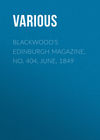Читайте только на Литрес
Raamatut ei saa failina alla laadida, kuid seda saab lugeda meie rakenduses või veebis.
Žanrid ja sildid
Vanusepiirang:
12+Ilmumiskuupäev Litres'is:
28 oktoober 2017Objętość:
320 lk 1 illustratsioonÕiguste omanik:
Public DomainСлайдер с книгами
Fb2ZIP-arhiiv 276.6 КБ
Sobib nutitelefonidele, Android-tahvelarvutitele, e-lugeritele (v.a Kindle) ja paljudele programmidele
HTML
Saate lugeda raamatut otse brauseris
HTMLZIP-arhiiv 280.3 КБ
Saate lugeda raamatut otse brauseris
TXT
Saab avada peaaegu igal seadmel
TXTZIP-arhiiv 187.8 КБ
Saab avada mis tahes arvutis
RTFZIP-arhiiv 287.9 КБ
Saab avada mis tahes arvutis
PDF A4
Avaneb Adobe Readeris
PDF A6
Optimeeritud ja sobib nutitelefonidele
Mobi
Sobib Kindle e-lugeritele ja Android-rakendustele
Epub
Sobib iOS-seadmetele (iPhone, iPad, iMac) ja enamikule lugemisrakendustele
iOS.Epub
Ideaalne iPhone'ile ja iPad'ile
Fb3
FB2 formaadi arendamine




















